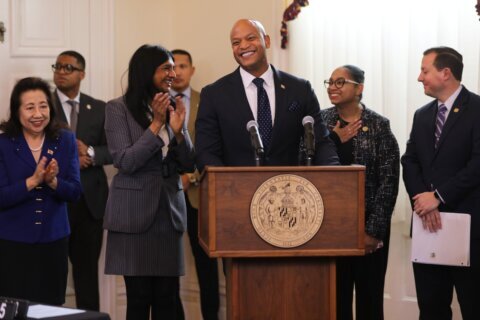A push to remove as many as 35 books from public school libraries in Frederick County, Maryland, has prompted the creation of a committee to examine the issue — and nearly 1,000 people have signed up to take on the task.
The list of challenged books is posted online.
The books are not assigned by teachers, but are in the library collections that students can select for reading on their own.
Kevin Cuppett is the executive director for curriculum, instruction and innovation at FCPS.
In an interview with WTOP, he explained how, typically, a parent will contact the student’s teacher if there’s a complaint about materials that students are assigned.
“That’s where 99.9% of the situations are resolved,” said Cuppett. In those cases, an alternative assignment may be given or different material may be used.
“Schools do that on an ongoing basis all year long,” he added.
Cuppett said when there’s a complaint about library books, often, informal meetings are held, and issues are resolved there. During the last reconsideration, there was one book targeted for removal from the school system, he said.
In this case, Cuppett told WTOP, three complainants “asserted that their complaints were not resolved” in meetings with the school system, so the issue is going to a body called a “reconsideration committee.”
School regulations provide for the formation of the committee, usually composed of 10 members. Because of the number of books being challenged, and the high number of people interested in serving on the committee, Cuppett said as many as 20 parents, five community members, 12 teachers, four administrators, four media specialists, 10 students and four curriculum specialists will be selected to serve on the panel.
The mechanism for how members will be chosen is outlined on the FCPS website under FAQs.
The meetings will not be open to the public and they will not be livestreamed, but the findings of the panel will be made public, Cuppett said.
Maryland’s Public Meetings Act describes what kind of meetings have to be open and accessible to the public. If a body is created through regulation, it may not have to be open to the public, but Cuppett said, “We just want to make sure that the process is fair, and that we follow the process to a T, so there’s going to be a ton of documentation as we move through this.”
Among the books on the list that garnered complaints are Kurt Vonnegut’s “Slaughterhouse Five” and Judy Blume’s “Forever.” Others include George M. Johnson’s “All Boys Aren’t Blue” and J.P. Stassen’s “Deogratias: A Tale of Rwanda.”
The committee member are likely to be selected by the beginning of next year.
“The readers have to do their homework,” Cuppett explained. “They have to read the book with certain criteria in mind and they must read the book taking on the perspective of the complainant,” asking themselves to keep in mind the areas of concern.
Cuppett said some of the feedback on the issue on the FCPS Facebook page indicated concerns over the time and taxpayer money being spent on reviewing the books based on just three complaints. Cuppett said that the decisions that are made based on this review could result in what he called an “in principle decision” — a finding that could essentially establish a precedent for similar challenges to in the future.
“If we feel the review of the first book is instructive, or we’ve ruled on the topic in principle, then we can keep the second book on the shelf without going through the whole committee process because we have an ‘in principle decision,'” Cuppett said.
Cuppett was asked if there’s any way to know whether the books on the challenge list are popular with students now.
“We haven’t done that kind of analysis,” he said in reference to circulation records for the books on the current challenge list. However, he said, “When books end up on challenge lists or they make the news as being controversial,” in school or public libraries, “sales of the books go up and circulation increases.”
When asked about how the school system can keep meetings from getting heated, Cuppett said a look at the applications so far indicated a “desire to have a reasonable and rational conversation around a book rather than a politicized conversation around a book.”
“I have a lot of faith in our parents, I have a lot of faith in our staff and our students and I think it will be an effective process,” Cuppett said.








